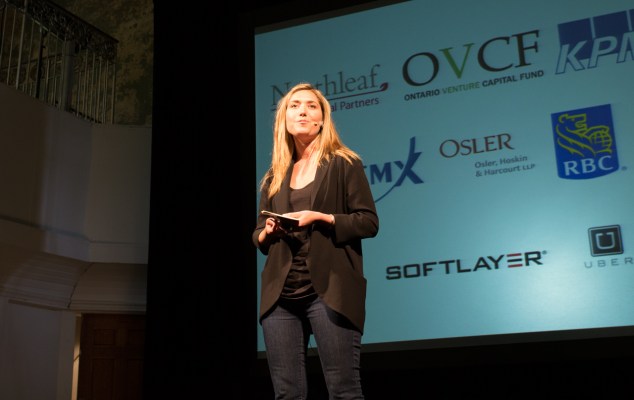Today was the Extreme Startups Spring 2013 Demo Day in Toronto, and the cohort of five startups all delivered. The list this time included Brika, Instaradio, Koge, Polychart and Sciencescape. It was an incredibly diverse group, targeting verticals ranging from ecommerce to media to business intelligence, but it’s rare to see a group so focused and prepared on the day. That’s a credit to the Extreme Startups prep process, and to the general maturity of the companies involved.
Here’s a brief summary of all the companies involved:
BRIKA -This company is essentially a hybrid of Etsy and Fab, curating maker-created goods with a focus on tastemaking. The founders both have lots of experience in both retail and fashion, and came together because of a mutual love for unique goods and tailored fashion recommendations. The startup itself is based around the idea that what Etsy provides is a good start, but what the maker community really needs is a better way to tell the story of goods and their creators. The company uses a drop shipping model to make sure that it never has to carry on-hand inventory, reducing costs.
The company has been building its traction since joining Extreme Startups, and says that both members and total sales are up since joining. They’ve closed $500,000 of their $1 million round.
Instaradio – As the name suggests, to some extent Instaradio wants to become the Instagram of audio content. Heard that before? So have I. But this company’s focus on live broadcasts and instant sharing of otherwise closed off events sets it apart. A user, for instance a comedian can start broadcasting their set, and instead of just serving a small audience of around 50 people max, the startup says some of their early users have seen traction of upwards of 1,000 listeners for a single broadcast.
So far, the company has had its app live for only 10 days, with 4,000 downloads and 8,000 broadcasts from its users. Their ultimate goal is to build a PA network of as many devices as possible, leverages all the mics we have everywhere. Sounds like it might be right up Robert Scoble’s alley.
Koge – This is a vitamin ecommerce business that’s taking the monthly subscription approach to health supplements. It’s a business that has gotten a lot of traction already since joining Extreme Startups, with a new partnership bringing it into Loblaws, a leading Canadian grocery chain, which should help immensely with introducing the idea to new customers who are unsure of buying vitamins from the Internet.
Polychart – A business intelligent startup that wants to leverage visual charts and other easily interpretable forms of data delivery to let everyday users who aren’t necessarily data scientists take advantage of big data trends. It’s a startup that will face a lot of competition in this booming market, but it really does seem to have nailed the drag and drop mechanics of making a truly user-friendly solution, so long as it gets the data sources right.
Sciencescape – The Toronto-based Sciencescape is a startup that’s operating in the hot medical research space. ResearchGate just landed a $35 million investment from Bill Gates and others. And Mendeley was acquired for between $70 and $100 million in early April, bought by publisher Elsevier. But Sciencescape is doing something different from either of these, trying to curate and make sense of the various bits of academic research that are flooding knowledge networks these days. Journal publications have skyrocketed, the startup says, and there’s nothing good to deal with it yet, hence the market need.
All the companies involved had raised at least half of their initial seed funding, and each had a clear go-to-market strategy in place. The keynote address by SoftTech VC partner Charles Hudson was all about how Canada seemed like a tricky place to invest, but how strong companies and continued investment from a few early pioneers has helped the startup community explode, especially for SV-based VC firms. This crop of companies is a good example of why those investors are looking north, and why they will likely continue to do so.
